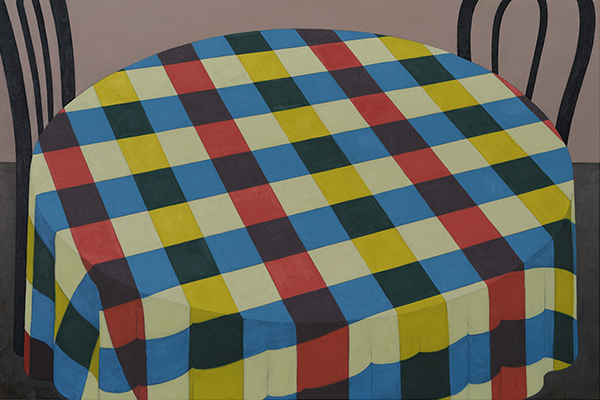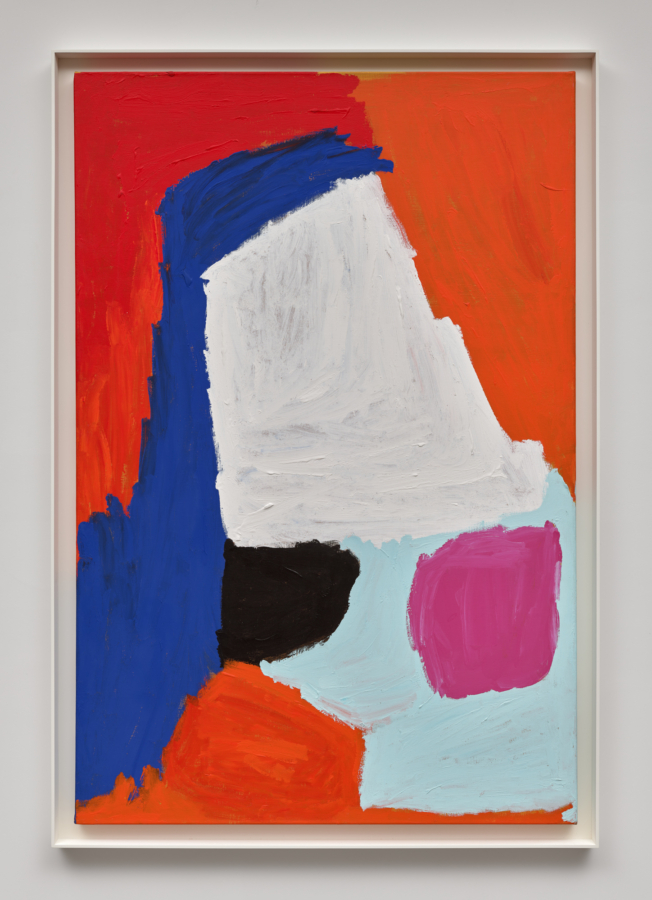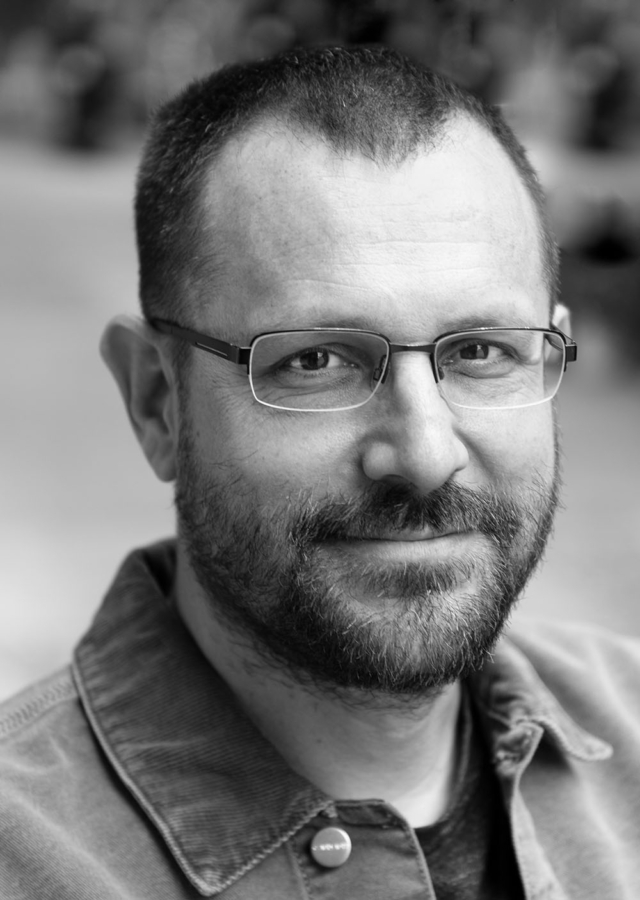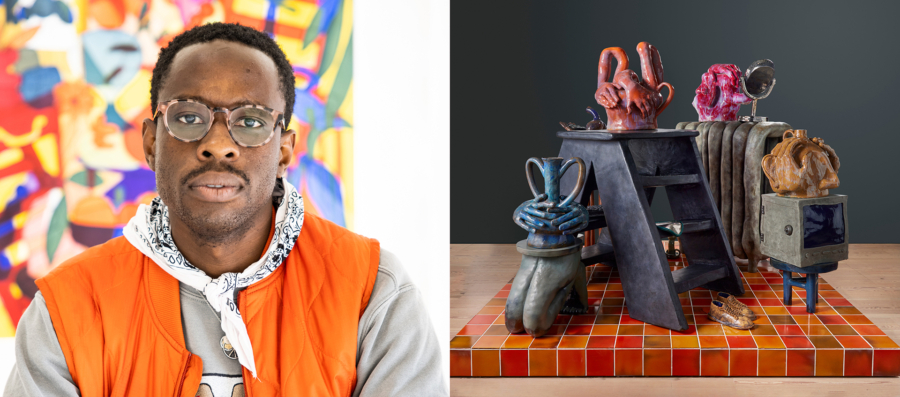October 6, 2022
Download as PDF
View on Wallpaper*
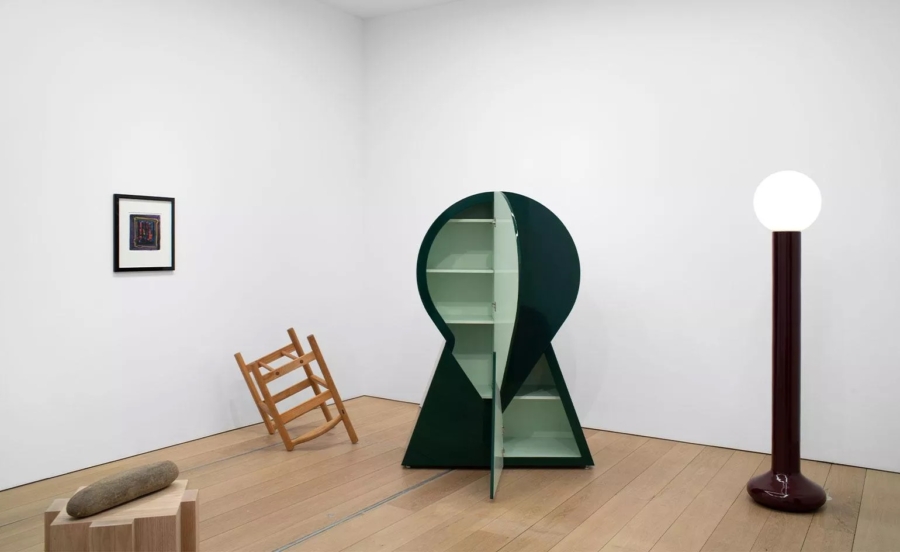
(Image credit: press)
Remember the name Ryan Preciado – it will be on the tip of tastemakers’ tongues for years to come. In January 2022, the 32-year-old artist, designer, and curator opened the first solo exhibition dedicated to his handmade furniture and sculpture, ‘A Cliff to Climb’, now on view at New York’s Canada gallery (until 5 March 2022). In 2021, examples of his ‘Nipomo’ and ‘Chumash’ chairs were acquired by a major Los Angeles institution. The former is an oversized, cushy deco-style armchair, hewn from hardwood and plush pointillist wool; the latter is a Native American reinterpretation of Danish modernist Børge Mogensen’s appropriation of the Mount Lebanon Shaker rocker.
‘I wanted to take what he took from America and reappropriate it back to Native America, my America,’ says Preciado, who is of Mexican and Chumash heritage, speaking to us in his voluminous, light-filled, green-floored, studio and showroom space in Arlington Heights, Los Angeles. ‘That’s my favourite piece.’
Over the past two years, Preciado has curated a stellar group show at South Willard gallery in LA’s Chinatown, and opened this studio a stone’s throw from The Underground Museum. Not a shabby pandemic resumé for a thirty-something with no art-school experience, who taught himself how to make furniture by apprenticing with a local designer in San Luis Obispo (known as SLO), and taking a couple of studio/gallery assistant jobs in LA.
‘Meeting Ryan Conder changed my entire life,’ says Preciado about South Willard’s owner, whom he first encountered right after moving to LA from SLO County on a whim eight years ago. A Google search for ‘cool places to shop’ led him to South Willard, which started as a multimedia menswear shop in West Hollywood. While this gallery and the design objects it exhibited would become his future, Preciado never let go of his past. ‘I really didn’t want to leave the Central Coast,’ he explains. ‘I liked the small-town vibe.’
Born in East Los Angeles, but raised in Nipomo, SLO County, Preciado grew up going to muscle-car and low-rider shows with his uncles, and pow-wows and basket-weaving workshops on the Chumash reservation in Santa Ynez with his grandmother (who runs a small heritage museum in Guadalupe). Preciado worked as a ranch hand and at a skateboard shop before he was hired at a furniture store in SLO, where local designer Jory Brigham sold his handmade pieces. The two bonded over motorcycles and when Brigham offered Preciado a full-time apprenticeship, he dropped out of community college the next day.
‘I just had to pick up things quickly by watching and doing. I appreciated Jory giving me the time in the shop when in reality I was probably slowing him down,’ says Preciado, who speaks in a very considered half-whisper. He’s surrounded by bookshelves (also of his making) filled with design tomes and objects made by friends like artist Roger Herman, ceramicists the Frimkesses, and his LA skating pal, the ascendant ceramic artist Sharif Farrag, with whom Preciado worked side-by-side after Sunday morning skating sessions to design a smaller version of his ‘Nipomo’ chair, with orange steel feet, light-blue wide-wale corduroy upholstery, and a ceramic button designed by Farrag.
‘In the same way that Peter Shire’s work is from a time period, but also timeless, I feel like Ryan is building and creating that kind of spirit for this time,’ says Farrag. ‘I’m just excited to see what comes next and I’m just happy to have this chair. When you can put a personality behind things you can use every day, that’s awesome. That’s the future, man.’
Though Preciado’s studio/showroom is somewhat empty at the moment, save for a mint-and-forest green room divider and a prototype of his new ‘Chicken Feet’ table, whose white oak bases, visible through the glass tabletops, are meant to mimic those of the fowl roaming the SLO County town of Arroyo Grande, and the undergirdings of LA freeways. Preciado hopes to offer a space for this kind of dialogue in his studio in the months to come. ‘I don’t have anything in here, so it’s an opportunity to make new stuff,’ he says. In many ways it seems like his iteration of his grandmother’s museum.
‘What’s interesting about Ryan is that he grew up looking at all these functional design objects that were considered art as well,’ says Conder. ‘Everything had a high level of functionality but there was also artistic integrity, too, so in a way, art was involved through his grandma his whole life.’
After their initial meeting and bonding over a shared interest in native plants, Preciado confided in Conder about his hope to work in furniture. The gallery owner connected the then 24-year-old to his old friend Peter Shire, and by his two-month mark in LA, Preciado had been hired as a carpenter in the studio of the Memphis Group star. He soon found himself making ceramics for Shire’s Echo Park Pottery collection. ‘At first, it was a lot of earning your keep: sanding for hours, sweeping up, and installing pieces, but I loved it,’ says Preciado.
‘In the studio he was kind of Ronin. He wasn’t going to be a journeyman, he was already independent,’ says Shire. ‘He was working in fashion before he came here. He was always a stylist with his vehicles and shirts just so – they’d call it pipa y guantes in Spanish, “pipes and gloves”, for a country boy he was pretty slick – and he’s a sourcer, he knew where a lot of obscure things were. He knew how to look for fabric. He’s a fabric guy. The big chairs revolve around what they’re made of. He’s every bit an autodidact.’
After working alongside Shire for four years, Preciado took a gig as an assistant to Conder, who taught him about design, offered him a chance to curate a show and gave advice on his budding designs. Inspired by the security and comfort of relaxing in a sun-melted plastic chair in his grandmother’s garden, Preciado set out to design his ‘Nipomo’ chair (and a sofa) along with the first ‘Chumash’ chair, all of which he made with a $9,000 educational grant from the reservation. ‘That’s what it takes,’ says Shire. ‘You gotta let it all hang out.’
Adds Conder, ‘Ryan had no money, so he invested every dollar he could into being a designer. The thing that Ryan did that was so smart was that he really thought about the integrity of materials he used: white oak and alder for the frames, vegetable-tanned Horween leather for the “Chumash” seat, and Raf Simons Kvadrat fabric for the “Nipomo” chair and sofa. He tried to make things with the most integrity, which is really interesting for someone coming from limited means. But he’s always looking at and researching stuff, he’s a very curious guy.’
That curiosity, relentless pursuit of executing new ideas at a high level, and his easy-going nature has led Preciado to be in a position to have enough work for the Canada gallery show within three years of posting his first piece on Instagram. The opportunity came through another Conder connection: the now in-demand painter Matt Connors, another South Willard alum.
‘He was interested in my furniture in a way that made me want to question things more and work a little harder,’ says Preciado. ‘He was the first person to buy a “Nipomo” chair. We’d talk architecture and design and just out of the blue, one day he offered me this show.’ Connors is showing new paintings in Canada’s main gallery, and was supposed to have work in the smaller space, but suggested Preciado use the space.
With a year to make this happen, Preciado got to work creating ‘A Cliff to Climb’. In addition to his chairs, auto-painted poplar ‘Nipomo’ lamp (which he’s also showing as a freestanding sculpture in an unpainted white oak without bulb), Preciado created a vertical dresser veneered with a sun-faded 30-year-old bird’s eye maple he calls ‘Snow White and the Seven Drawers’.
His obsession with auto paint carries over into his ‘Pope’ cabinet, which takes the shape of the pontiff’s zucchetto (skull cap). To get the perfect finish he enlisted a car painter named José Angulo to coat it with thick layers of green Dimension auto paint – wheeling it in and out of an active body shop in LA’s Boyle Heights as cars came through to be sprayed – that took two months to get right.
A black room divider with interior shelves for sculptures and books is given the same heavy paint treatment. (In fact, most of Preciado’s works utilise car paint as a nod to the low-rider culture he grew up with.) Preciado even instructed Canada gallery to invite visitors to sit on the chairs, as a way to ‘domesticate’ the space. ‘It’s disarming, it’s asking you to be part of this room and sit down and take your time, which is nice, especially in a gallery space,’ says Preciado. ‘I’m just glad to be, hopefully, a little bit disarming.’
Elsewhere, the ‘Ira’ shelf, hewn from MDF and aluminium veneer, gives off a Silver Factory-meets-Sottsass vibe with an Indigenous-styled red sun sculpture attached to the top in place of a smile. The piece is Preciado’s interpretation of a picture of himself and his mother, arms outstretched, during a skating session at an old roller rink. There’s even a hard-edged Op Art painting, Sun, made with leftover paints, that presides over the show. The exhibition might be considered a collaboration, as Connors’ and Preciado’s works bleed into each other’s galleries seamlessly. The pair have a book coming out in time for the closing, which, Preciado explains, will be ‘our text thread that’s essentially the everyday objects we’re interested in, like the close-up of a doorknob’.
Perhaps the most disarming, or grounding, object in the show may well be the only thing Preciado didn’t create. On top of his white oak ‘Prado’ table rests an ancient Chumash pestle. ‘I thought it was [key] to take up space for something that’s really important,’ he says. ‘My grandmother would talk to me about how everything was created for a specific reason and things were made with integrity and how that pestle could be used today the same way it was used thousands of years ago. That always stood with me, this object being able to withstand time. That’s why I use white oak in a lot of pieces. I want it to last.’
